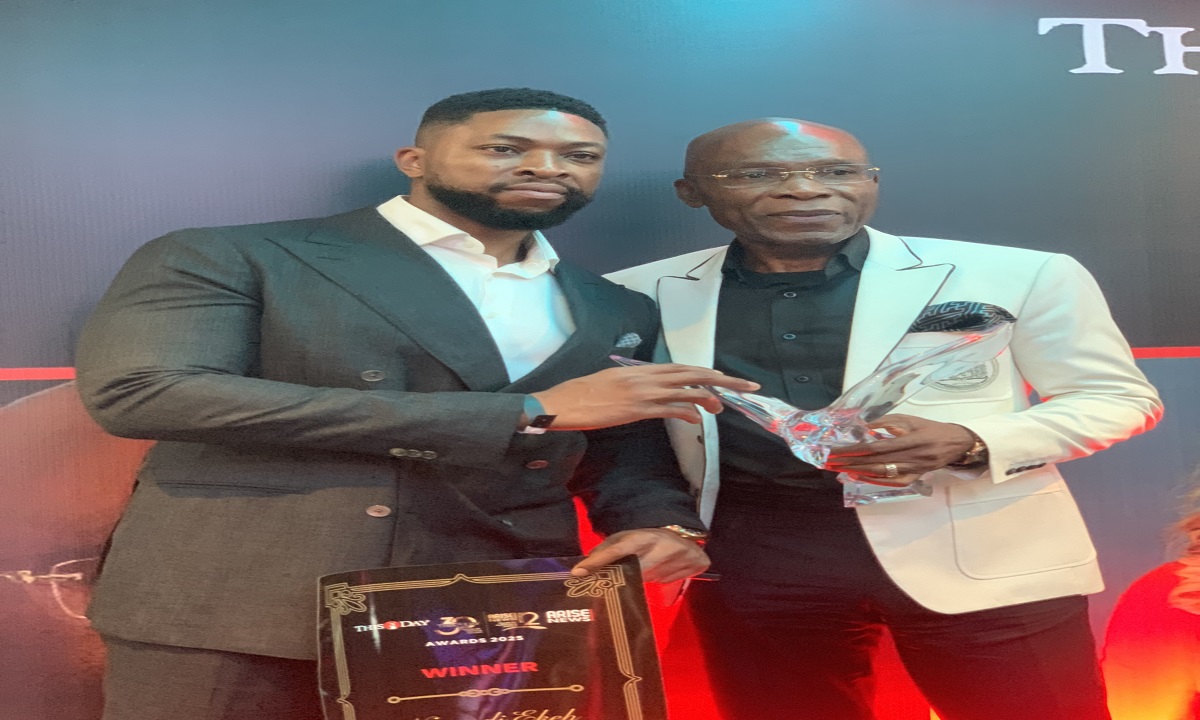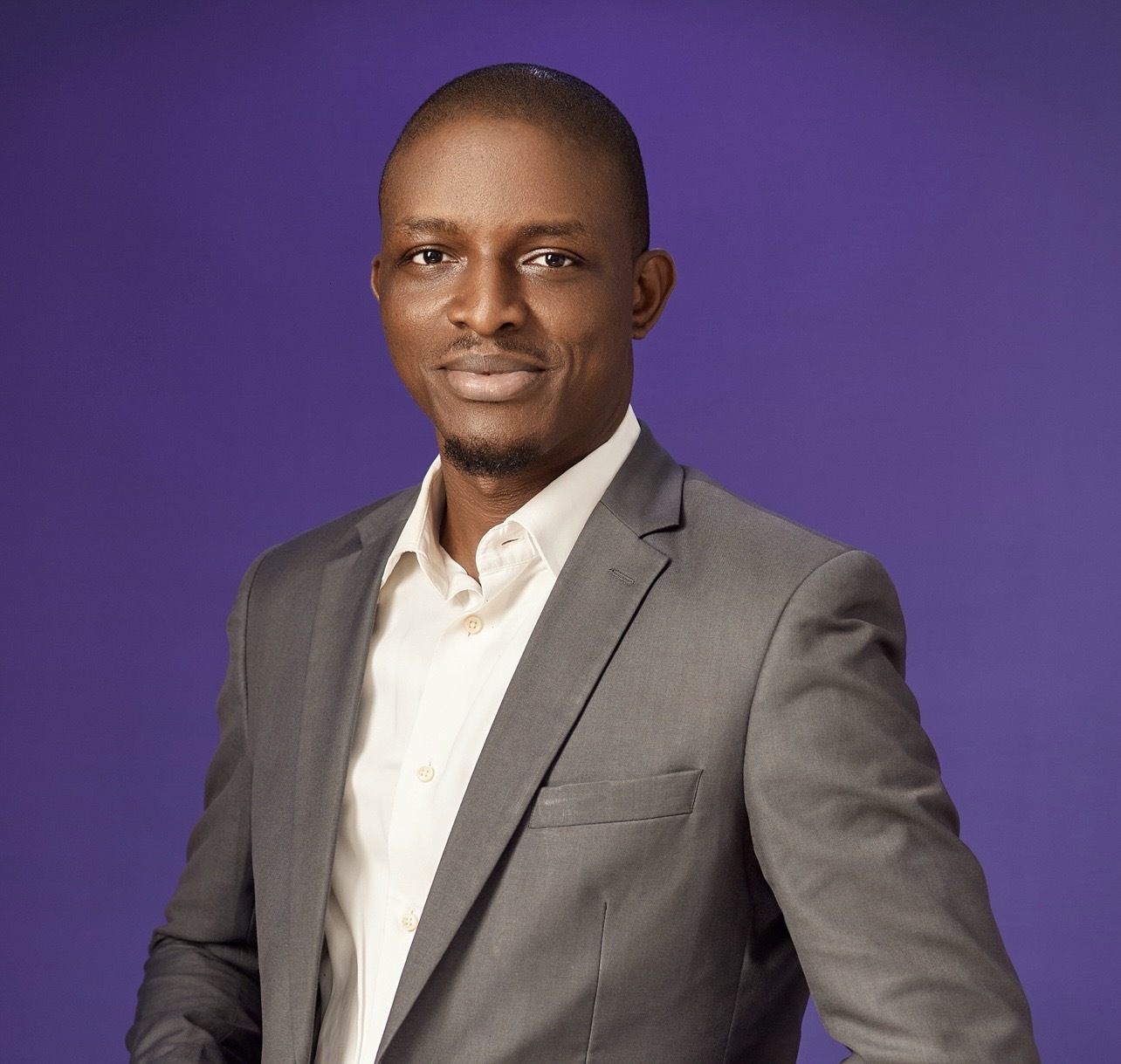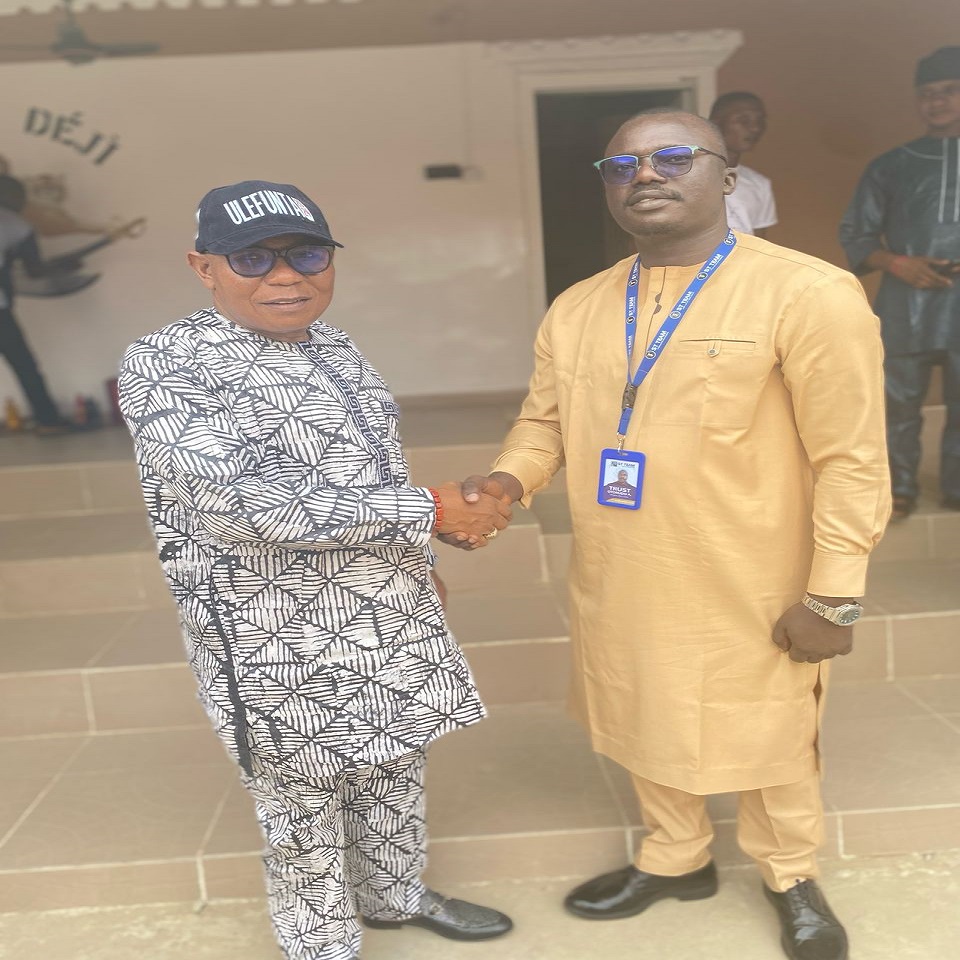News
The Ekehs: Digital Father and Son Shine at Thisday Awards

By Sola Odumosu
History was made on the evening of Monday, January 27, in Lagos at the colourful Thisday Awards ceremony when serial digital entrepreneur, Leo Stan Ekeh, shared the same podium with his son, Prince Nnamdi Ekeh, as winners in different categories of the much-coveted awards. The awards commemorated the 30th and 12th anniversaries of Thisday Newspapers and Arise News, respectively.

While the father, who is the Chairman of Zinox Group, was honoured as CEO of the Year, his Oxford-trained son, Prince, the CEO of Konga Group, was decorated with the Young Global Leader Award for his transformative role in navigating Konga as a foremost composite e-commerce giant in Nigeria and Africa. It was historic, being the first time ever that a father and his son would be honoured on the same night in the nation’s Infotech ecosystem.
Who is This Prince?
Prince Ekeh was 19 and a student at University of Lancaster, United Kingdom, when he birthed the idea of Yudala, a brutally ambitious e-commerce outpost. Majoring in Economics/Politics with a minor in Entrepreneurship, young Ekeh was not going to leave the idea merely as a paper concept. He was in a hurry to birth it to life. And while back home to serve his fatherland under the auspices of the National Youth Service Corps (NYSC), Yudala was born, becoming a place of activity employing over 250 staff at that time. And ever since, he has navigated the company to the crest of e-commerce players in Africa. He would later top up his academic kit with an MBA from Oxford and numerous entrepreneurial certifications from Lagos Business School, Leysin American School, Switzerland, and Harvard, among others.
Yudala was the first composite e-commerce outpost in Nigeria (a hybrid of the online-offline one-stop-shop). This idea has caught global attention and is now being replicated across the continent. Smart and endowed with bullish strength and uncommon intuition to sniff the next opportunity, Prince in 2018 achieved what many thought impossible. His start-up, Yudala, acquired Konga, a top player in Nigeria’s e-commerce space, in a landmark merger that became effective May 1, 2018. The young whiz has since expanded Konga to a leading e-commerce house in Africa, retaining the composite character of Yudala. He has creatively expanded the market share value and networth of Konga by building its business verticals to include logistics, fintech, travel, and leisure.
Young Prince Ekeh is not new to awards. He had been nominated for the prestigious Future Awards for Business Excellence, and featured as Top 100 Most Influential People of African Descent (MIPAD) in response to the proclamation by United Nation’s General Assembly Resolution 68/237, and had been awarded Icon of Human Transformation by the National Association of Nigerian Students. The Thisday award is, therefore, another feather to the decorated cap of the savvy entrepreneur in a hurry to make his mark.
Leo Stan, a Peculiar Breed
His father, popularly called Leo Stan, was honoured with the CEO of the Year Award in the private sector, the only CEO in the highly competitive and sometimes treacherous private sector to be so honoured. The historical and symbolic moment was not lost on him. He recognised the honour of sharing the same platform with his son, both being rewarded for their peerless contribution to Nigeria, nay Africa, digital economy. It was a rarity, more so, as they shared the same podium with President Bola Ahmed Tinubu, who was voted Thisday Man of the Year for his bold reforms and leadership exemplum on the African continent.
Leo Stan deserves the honour, and he has seen many in his over three decades of entrepreneurship and unrelenting promotion of digital democracy in Nigeria. It was no coincidence that when Thisday turned 30 years, it could not find any Nigerian more worthy than Leo Stan for the award of CEO of the Year. It’s both instructive and divine especially when you consider that Leo Stan was the man who computerized newspaper houses, advertising agencies, and printing presses in Nigeria in the late 80s and early 90s when many Nigerians were still in awe of the computer and all its magical, even mythical, wand.
Since returning from the United Kingdom to start his entrepreneurship odyssey in IT over 30 years ago, Leo Stan has stood out as a bustling serial digital pioneer with an elephantine ambition to computerize Nigeria — a mission he has achieved on many fronts.
His zeal and passion have placed him at the cusp of the competition with many firsts to his badge. The first internationally certified indigenous computer brand in West Africa and the first computer brand in the world to incorporate the Naira sign (₦) on its keyboard. First Original Equipment Manufacturer (OEM) in sub-Saharan Africa to receive Microsoft Windows Hardware Quality Lab Certification (WHQL); first Microsoft Prime Production Online Automation Partner in Sub-Saharan Africa with the OA Version 3.0; first Intel Premium Partner; first OEM in West Africa to attain the ISO 9001-2015 Certification; first to acquire the Google Mobile Application Distribution Agreement (MADA) in West Africa; first OEM in Nigeria to introduce renewable energy and lifestyle products and attaining the status of Intel Platinum Partner in sub-Saharan Africa.
When he launched the Zinox brand in 2001, it was not just an addition to the crowd of indigenous-branded computers. It was a fitting counterfoil to the dominance of foreign computer brands in Nigeria. Zinox has since become an African brand.
Zinox has proven both competence and capacity at home and in other parts of Africa. It was the preferred technology that powered several mega projects including the 8th All Africa Games codenamed COJA 2003; the 18th Commonwealth Heads of Government Meeting (CHOGM) held in Nigeria in 2003; the All-Africa University Games held in Bauchi in 2004; the 7th Ordinary Session of the Assembly of the Africa Union (AU) held in The Gambia in 2006. It has also undertaken critical interventions by transforming the Nigeria and Guinea Bissau electoral systems from analogue to digital. The conduct of Nigeria general elections in 2007 and 2011 using digitally produced voter register for the first time in Nigeria was because of Zinox. It has also fully provided the technology for the postponed first ever national digital census in Nigeria.
Leo Stan is an intentional family man who has built a digital family. His wife, Lady Chioma Ekeh, a mathematician and chartered accountant oversees the biggest tech distribution company in sub – Saharan Africa, TD Africa. His first son and co-awardee, Prince Nnamdi Ekeh leads Konga Group. His first daughter, Mrs. Gozy Ajogun (nee Ekeh), an alumnus of London School of Economics (LSE) oversees Task Systems, an ICT solutions firm under the Zinox Group. The second daughter, Miss Chidalu Ekeh, with a Masters in Digital Marketing from Imperial College, London, is a Fintech whiz. At the same time, his other two younger sons also play in the tech space. He has added digital value to Nigeria and Africa. He deserves his award and the historical honour of being garlanded with his son. It’s double congratulations to Africa’s dominant digital family. It was indeed their night.
Odumosu, an ICT media connoisseur, writes from Lagos.
News
Senate Committee Partners with Kuda Bank to Tackle Compliance Crisis as Nigeria Loses ₦3.4 Trillion

Over ₦3.4 trillion in financial infractions were uncovered across federal Ministries, Departments, and Agencies (MDAs) in 2021, according to the Auditor General’s report — a staggering figure that highlights Nigeria’s deepening compliance crisis and the urgent need for stronger oversight in public institutions.

In response, the Senate Committee on Legislative Compliance is hosting a high-level workshop to address the root causes of weak oversight and institutional gaps. The two-day event, with the theme ‘Consolidating Strategies for Strengthening Legislative Compliance by MDAs’, will take place on April 15 and 16, 2025 at NAF Suites, Abuja, bringing together lawmakers, regulators, and over two hundred representatives from federal MDAs.
Kuda Microfinance Bank is co-sponsoring the workshop as part of its commitment to supporting responsible innovation, governance, and regulatory alignment in Nigeria’s financial ecosystem.
Rasaq Kadri, Kuda’s Head of Compliance, will deliver a keynote address on the second day of the event, highlighting the efforts of Nigeria’s fintechs to promote inclusion and financial literacy without compromising on compliance best practices.
“When public funds go unaccounted for, it doesn’t just damage government credibility, it affects the entire financial ecosystem, including fintechs,” said Kadri. “We can’t build trust-driven products in a trust-deficient environment. Every time compliance is treated as a box-ticking exercise, we miss the chance to build something that lasts. Fintechs have the tools and perspective to support better governance, but more importantly, we have a responsibility to be part of the solution.”
As a sponsor, Kuda will take the workshop to engage directly with key stakeholders in Nigeria’s regulatory and public service ecosystem.
Plenary sessions will be chaired by the Honourable Attorney General of the Federation, Lateef Fagbemi SAN, and the Honourable Minister of Finance, Wale Edun. Conversations will focus on closing compliance gaps, strengthening institutional transparency, and promoting cross-sector collaboration.
The Senate Committee on Legislative Compliance Workshop is a unique platform for dialogue, knowledge-sharing, and collaborative action.
News
FG Inaugurates Board of Galaxy Backbone

The Federal Government has inaugurated the new Board of Directors of Galaxy Backbone Limited (GBB). The board’s mandate is to lead Nigeria’s digital transformation in Information and Communication Technology (ICT) infrastructure and services.

It will support Federal Government Ministries, Departments, and Agencies (MDAs) in a fast-changing landscape.
George Akume, Secretary to the Government of the Federation, led the inauguration. He emphasised the government’s commitment to making GBB more agile, responsive, and impactful. The aim is to drive national digital public infrastructure and service delivery. This was according to a statement by Segun Imohiosen, Director of Information and Public Relations.
The board has George Akume as Chairman. Its members include Rabi’a Adamu Waziri from the Petroleum Technology Development Fund (PTDF), Abubakar Abdulqadir Maje from the Joint Stock Association (JSA), Kemi Owonubi from the Ministry of Finance Incorporated (MOFI), and Margareth Ebute from the Ministry of Communications and Digital Economy.
Other members are Ibrahim Adeyanju, Olusegun, Olumbe Akinkugbe, Sanni Ibrahim Mohammed, and Adama Pindar from Galaxy Backbone Limited.
In his acceptance speech, Prof. Ibrahim Adepoju Adeyanju, Managing Director of Galaxy Backbone Limited, assured that the board will focus on sustainability. He said it plans to realign its vision and build a strong foundation for achieving strategic goals.
He also noted that within one year, the agency developed its Integrated Digital Transformation Strategy (IDTS). This strategy will run from 2025 to 2028.
News
ST Team Partners with Deji of Akure to Boost Agriculture and Food Security in Ondo State

Smart Treasure (ST Team) has honored the Deji of Akure, His Royal Highness Ọbá Aladetoyinbo Ogunlade Aladelusi, Odundun II, CFR, with a plaque of recognition for his dedication to the welfare of his subjects.

The presentation was made at the monarch’s palace in Akure by a delegation led by Instructor Luke Mbadugha from the Lagos Operations Center.
The visit was part of ongoing discussions on a partnership aimed at boosting agriculture in Akure, Ondo State.
The initiative, spearheaded by the ST Team, seeks to ensure the availability of farmland for agricultural purposes.
Under the arrangement, the ST Team will provide seedlings and manpower, while a significant portion of the proceeds will be distributed to the indigenes at no cost.
The remaining proceeds will support the administrative operations of the ST Team.
In his response, Ọbá Aladetoyinbo announced the allocation of a parcel of land at Ofosu, along the Ondo-Benin Road, for the project.
He described the initiative as a commendable effort to enhance food security for both the local community and the nation.
The monarch also called for a follow-up meeting to facilitate the assessment of the land for the project’s commencement.
Meanwhile, farming activities are set to resume at Aladodo Isikan in Akure South Local Government Area, another site designated for the agricultural project.
The four-acre land will be used to cultivate crops such as yam, cassava, plantain, and maize. A test run of maize planting began on April 9, 2025, with expectations of harvesting in three months.
Kabiesi Akinwunmi Adekanmbi Obey, the monarch of Olulero Okelero, Onitan Isikan, lauded the ST Team for their commitment to ensuring food availability.
He emphasized the importance of agriculture, stating, “Whoever brings food brings life.”
The ST Team, an investment platform dedicated to reducing poverty in Africa by 30% by 2027, has been actively involved in various Corporate Social Responsibility programs, including this agricultural initiative.
The project underscores their mission to create financial freedom and improve the quality of life for individuals across the continent.

 General News2 days ago
General News2 days agoAFD Commits €3m to Africa’s Financial Inclusion

 E-Financial2 days ago
E-Financial2 days agoVerve Expands Payment Frontiers with Global Partnerships, Contactless Innovation

 General News2 days ago
General News2 days agoEU Aims to Remove Barriers to AI Development

 News2 days ago
News2 days agoFG Inaugurates Board of Galaxy Backbone

 E-Business2 days ago
E-Business2 days agoAfrica Plans to Establish a $60Bn AI Fund

 E-Business1 day ago
E-Business1 day agoCyberattacks: ‘56 Percent of Cases Stem from Existing Logins

 News2 days ago
News2 days agoST Team Partners with Deji of Akure to Boost Agriculture and Food Security in Ondo State

 Telecom2 days ago
Telecom2 days agoBolt’s Playtivism Campaign Brings Chess Park to Lagos


























